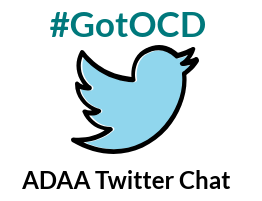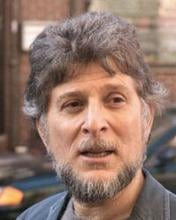ADAA Members Share Their Expertise on OCD
ADAA Members Share Their Expertise on OCD

On February 7, 2019, ADAA held a Twitter chat under the title #GotOCD. ADAA member experts Jonathan Grayson, PhD and Jenny Yip, PsyD, ABPP answered questions on the different types of OCD and treatment. Read the Q&A below:
ADAA Questions:
Q1: What is OCD? How do I know if I have OCD?
Dr. Grayson: OCD is a disorder that is both learned and biological. At its core, most OCD concerns arise from the person wanting to be absolutely certain about an issue: am I clean? Am I gay? What do these thoughts mean about me? The problem is that being absolutely certain is impossible.
Q2: What does it mean to live with uncertainty?
Dr. Grayson: Nothing in life is certain - low and high probability events happen. You don't want to die or be paralyzed, but you get in a car and take that risk. You don't say I'm not getting into a car if it might crash. You live with that risk. Living with uncertainty means learning to live with risk and hoping that you can cope. The reason to do so is that there isn't another choice. Again, you can't get into a car if you demand 0 probability of accident. So living with uncertainty is not trying to figure out probabilities, but living in a world where anything might happen
Q3: What is pediatric OCD? How does it affect the family?
Dr. Grayson: Simply said, pediatric OCD is children with OCD. Like all OCD, the effect on the family is the helplessness they feel and the accommodations they make to try to "help" the child's distress. Like all treatment, we don't want to force the child to stop or change. Professionals are often needed to provide the balance of understanding and treatment. There are some great books to help parents understand their child's OCD and treatment.
Q4: What is postpartum OCD and how can it be distinguished from normal parental worrying about a child?
Dr. Grayson: I often say that all new parents are OCD. The true difference is when you are consumed by worry and/or rituals, so that there is little joy in life or your newborn.
Dr. Yip: Most new parents have intrusive thoughts of harm or accidents that can occur to your newborn. This is evolutionarily healthy to help tired, sleepless parents be mindful of caring for the helpless infant. However, when intrusive thoughts & behaviors to prevent potential harm interfere with the parent-infant bonding process, it then becomes Postpartum OCD. If you're cleaning, sanitizing, checking on your baby at the expense of sleep or even avoiding your baby, get help!
Q5: What is the goal of treatment?
Dr. Grayson: The goal to treatment is to live with uncertainty. Success is not making the right decisions, but choosing to live with the consequences of the decisions you have made. You never know the outcome of a decision at the time of making it.
Other questions:
Q: Is there really such a thing as pure OCD?
Dr. Yip: Pure O exists even though the term is actually a misnomer. A person suffering from Pure O, will have "mental" compulsions that isn't outwardly visible, such as mental reviewing, checking, rationalizing, ruminations, etc. It can be mentally taxing and torturous.
Dr. Grayson: Another important fact about pure O. There are no intrusive thoughts. What makes a thought OCD is if you want to know what it means or you want it to stop. Content doesn't matter.
Q: So, pure OCD is the only form of OCD without intrusive thoughts?
Dr. Grayson: No. What I'm saying is ALL thoughts are normal. The fact you don't like a thought doesn't make it abnormal. No one can not think a thought. I have to think the thought I don't want. Look at the horrific content of TV, Horror is popular.
Dr. Yip: A thought is a thought is a thought is a thought. Nothing more and nothing less. A thought cannot harm you. Only you can give a thought meaning and power. When you try to not think about a thought, you're actually focusing more attention onto the thought. Don't think of the yellow duck, what happens? This is why "diets" don't work. You can't eat chocolate... Don't think of chocolate... Oh no, now I want chocolate. Exposure therapy means purposely think of the thought that you're avoiding. Purposely expose yourself to that ginormous yellow duck. The more you do, the more the yellow duck will fade and the less power it will have.
Dr. Grayson: Though I would put it differently. Some would try to use a "thought is a thought" as reassurance. I would go for anything might happen, I can't control thoughts, how would I try to cope (not give up or ritualize) if the worst happens. No one wants cancer or death of a loved one. but life goes on and the goal is coping. Humans can't do any better. This is the goal of OCD treatment and all of life.
Q: Are there any risk factors for OCD?
Dr. Yip: The biggest risk factor for OCD is not getting proper Cognitive-Behavior Treatment (CBT). Stats show that it takes an average of 14-17 years for a sufferer to get appropriate treatment. That is simply unacceptable and a reminder of the awareness we need to raise!!
Dr. Grayson: OCD has a genetic basis, if 1 parent has OCD, there is a 25% a child will have it. Trying to help any child cope with the uncertainties of life will be helpful and a child at risk will be helped by this, but if they have the genes, they likely will have it. However, this isn't a reason to not have kids. The people I see have great lives once they overcome their OCD and they don't wish they never had it, because the like who they are and know they would be someone else if they hadn’t had OCD.
Q: What are current directions in the field of OCD treatment?
Dr. Yip: Evidence-based treatment is still Exposure & Response Prevention (ERP) which is a type of Cognitive-Behavior Therapy (CBT). Meds such as SSRIs can be useful to facilitate ERP. There's also research indicating effectiveness of DBS and rTMS for refractory OCD. Exposure therapy helps sufferers to become stronger from OCD and anxiety by learning to face fears w/o engaging in compulsive or safety behaviors. By gaining the feedback that your fears actually aren't that threatening, you're changing the neurochemistry of your brain.
Q: How does learning to live with uncertainty relate to neutral obsessions? (Like focusing on breathing or a song) Also, can anxiety give rise to physics sensations like the chills, twitching, etc...?
Dr. Grayson: Great question. It is a little different with neutral obsessions, because these rely upon the wishing ritual, which is comparing real life to a fantasy life - in this case how much better life would be if I didn’t notice x. In these cases, teaching someone how to live. And to accept living with the thoughts and understanding how to do this without suffering is the goal.
Q: Thoughts on residential treatment?
Dr. Yip: Residential or Intensive Outpatient Treatment (IOP) can be useful for sufferers who have very severe, complicated OCD, or who are completely debilitated. Just remember that you'll need to apply the same tools learned during treatment to your natural environment.
Q: Is it possible to have different OCD themes one after another?
Dr. Yip: Great question! And yes absolutely! In fact sufferers often have multiple OCD themes occurring at the same time. OCD can be a trickster. The goal is to gain tools to defeat any and all themes that come up with Exposure & Response Prevention Therapy (ERP) - a type of CBT.












